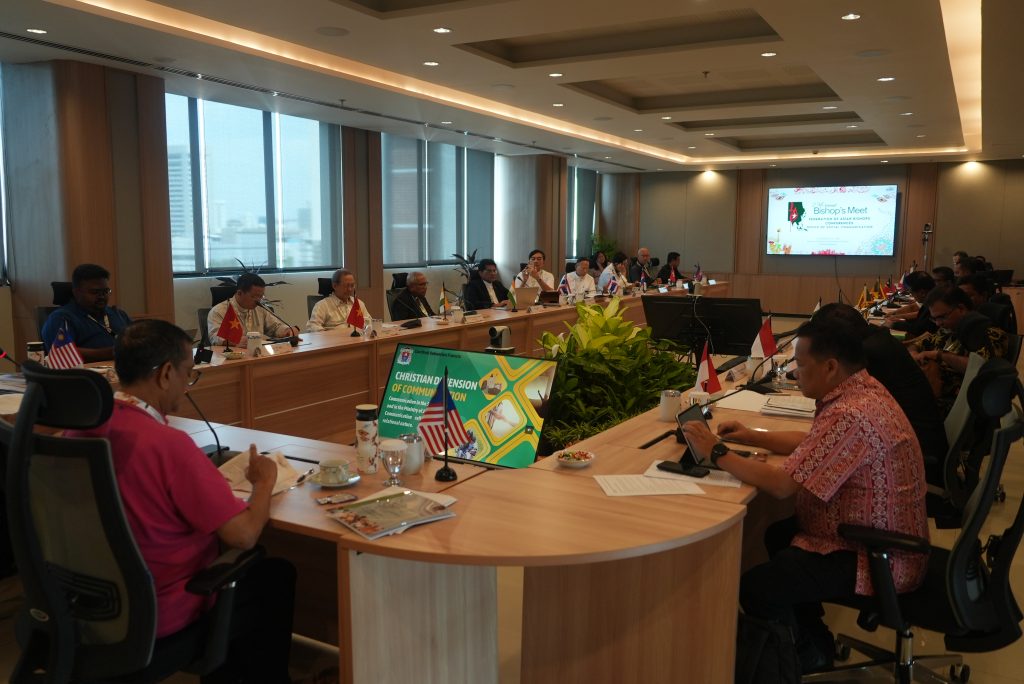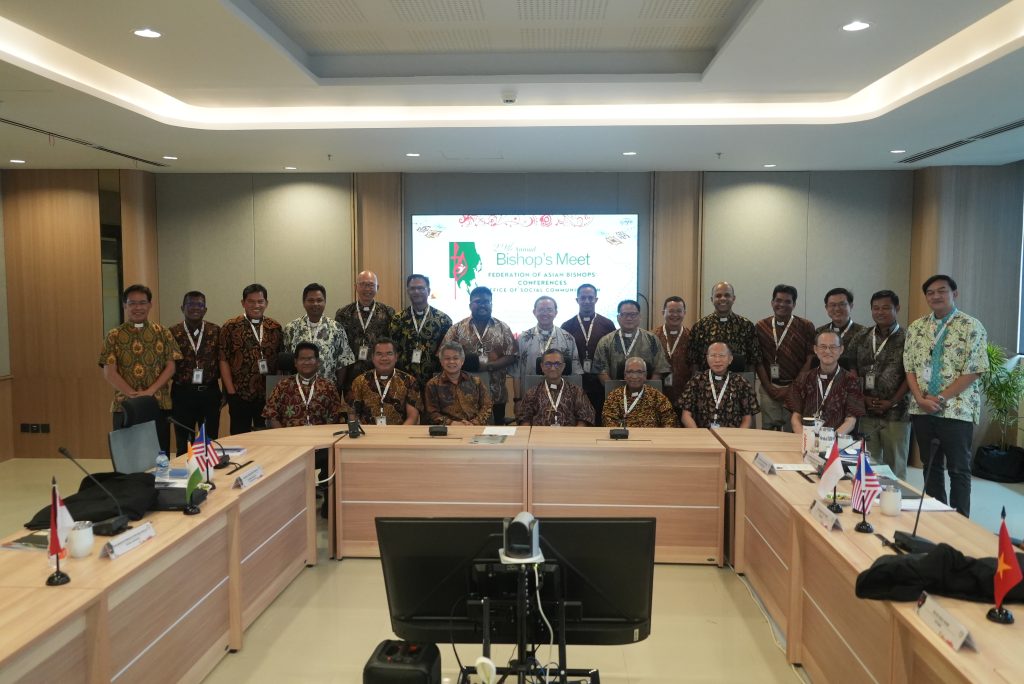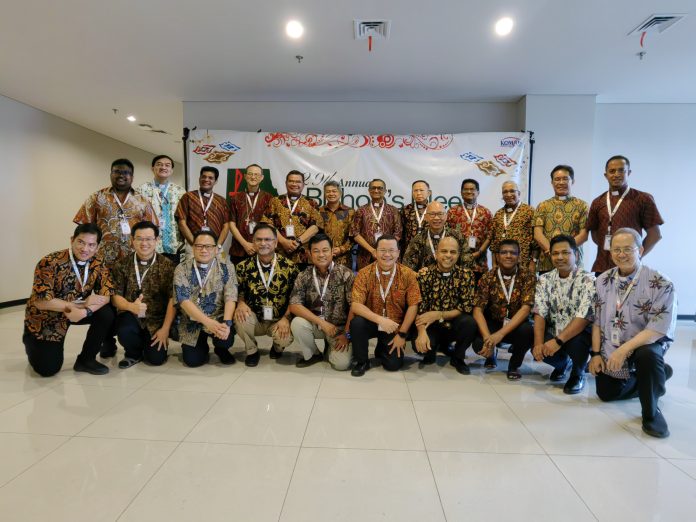We, the 23 participants comprising bishops, priests, and laypersons gathered at the Bishops’ Conference of Indonesia Centre (KWI) in Jakarta, Indonesia, from 25–29 November 2024, for the 29th Annual FABC-OSC Bishops’ Meet. We represent the Episcopal Commissions for Social Communication of the member-conferences and associate members of the Federation of Asian Bishops’ Conferences (FABC). The Annual Bishops’ Meet-2024 was attended by the Conferences of Malaysia–Singapore–Brunei, Cambodia–Laos, India, Indonesia, Japan, Pakistan, the Philippines, Sri Lanka, Bangladesh, Thailand, Timor-Leste, Vietnam, and Hong Kong.
The newly constructed KWI Centre, visited by Pope Francis in September, provided ideal ambient for prayer, reflection, sharing and mutual listening and discussion during the Meet. We were deeply humbled by the warm hospitality extended by our host country, Indonesia.
The participants presented reports of their activities in the area of communication, highlighting achievements and challenges in their service to the episcopal conferences and local churches in the respective countries. The participants shared daily moments of prayer through concelebrated Eucharist, Lauds and Vespers. They also made visits to some historic locations in the city, shared fellowship meals and spent fruitful time of interaction with one another.
The theme of this year’s meeting “Communication for a Synodal Church in Asia,” served as the guiding focus for our reflections, discussions, and spiritual conversations throughout the event.
Our deliberations were enriched on the first day by Prof. Richardus Eko Indirajit, Rector, Pradita University, and Chairman of the Central Board of Teachers’ Association of the Republic of Indonesia, who presented on the theme of human dimension of communication: communication at the heart of human relations. On the second day, Cardinal Sebastian Francis, Chairman of FABC-OSC, led the session on the Christian dimension of communication: communication in the scriptures and the ministry of Jesus. The third day featured a presentation by Fr. George Plathottam, SDB, Executive Secretary, FABC-OSC, and Consultant to the Holy See’s Dicastery for Communication, on the theme of ecclesial dimension: communication and synodality, and the ecclesiological vision of Pope Francis. All the presentations focused on the theme of Synodality for a Synodal Church and emerging ecclesial challenges and perspectives in communication in the vast and diverse continent of Asia.
Each day the sessions were followed by Conversation in the Spirit. The participants met in three groups to reflect, listen and share at depth on the questions related to the theme of the day. These conversations, interspersed with moments of prayer and silent listening, and guided by the Holy Spirit, proved to be deeply fruitful and inspiring. This statement highlights some of the key outcomes from these conversations. The sharing from the Conversation in the Spirit emphasised the Spirit-led nature of communication within the Church.

Participants highlighted how genuine listening fosters openness and inclusivity, creating spaces where everyone’s voice is heard. The synodal journey is an invitation to the whole Church for conversion and renewal and to affirm the fundamental equality of all people as children of God, and all the baptised in Christ to share in the mission of proclaiming and witnessing to the Gospel. Communication calls for an encounter in the spirit of the Gospel and attentive listening to the voices of people, especially of those who are in the margins of society. It affirmed the importance of personal encounter, real presence and heartfelt exchanges which can deepen understanding and collaboration, as opposed to hierarchical, one-way or monopolized communication. Through empathy and Spirit-guided conversations, conflicting perspectives can be reconciled, leading to fruitful resolutions that build communion.
A recurring theme was the pivotal role of technology in modern evangelization and communication. While challenges such as language diversity, generational gaps, and government restrictions persist in various parts of Asia, the meeting emphasised the need to adopt critically and creatively the modern means of communication. These include solutions like listening apps, social media platforms, and AI translations which are capable of bridging these gaps. The digital environment has become a tool to amplify messages of love, solidarity, and faith, while respecting diverse contexts. Even while embracing these technological opportunities, there was a call to prioritize personal connections over superficial digital interactions.
Synodality was explored as both a journey and a way of being. Participants reflected on its relational nature—walking with and listening to people while fostering communion within the Church and society. This approach, inspired by Christ’s example, calls for leaders to journey with their communities, not merely guide them from a distance. Synodality also invites harmony within ministries and encourages the integration of modern strategies to support collaborative approach to mission.
The meeting acknowledged the challenges of staying relevant in the digital age. Bishops, priests and lay communicators were encouraged to embrace technology responsibly while remaining rooted in the Church’s mission. Practical suggestions included using digital tools to share the Gospel, engaging parishioners in social communication training, and convincing the reluctant to embrace the emerging tools of communication. The Holy Spirit’s presence was seen as vital in ensuring that these innovations conform to the Church’s mission and values.
The Bishops’ Meet underscored that the Church, inspired by Pentecost, is called to balance inward reflection (ad intra) with outward engagement (ad extra). The Spirit’s guidance enables the Church to greater openness, transcending traditional barriers, rigid norms and jurisdictions, and resistance to change. By embracing both the communal and missionary dimensions, the Church can respond effectively to contemporary challenges and remain a transformative presence in the world.
The meeting concluded with a solemn Holy Mass, presided over by the Apostolic Nuncio to Indonesia, Archbishop Piero Pioppo, bringing a fitting and spiritual end to our time together. He reminded the communicators of their mission to manifest the revelation of God in Christ and its redemptive and salvific mystery to the world in our times.

Orientations Recommendations
The Bishops’ Meet 2024 proposed the following orientations and recommendations for strengthening communication ministry for a Synodal Church in Asia:
1 Communication ministry in the episcopal conferences must give greater priority to a more attentive and focused listening at all levels of ministry. Listening is at the heart of building a Synodal Church. Hence, every effort must be made to heed the call of Pope Francis to allow people to speak freely and for pastoral leaders to be attentive and open to ‘listen with the ears of the heart’.
2 Considering the rapid changes in communication and the growing impact of digital technology and AI, the communication offices in FABC need to give greater attention to their adoption. In order to do so, the Conferences must make more investment in communication technology and infrastructure, so that the Church’s communication ministry does not lag behind.
3 Church personnel at all levels, including priests, religious, seminarians and youth, must be trained in order to be able to effectively adopt digital platforms and modern-day communication tools for a more fruitful ministry towards building a synodal Church. Skill training for a more creative and fruitful pastoral use of technology must be given greater attention.
4 The Offices of Social Communication in episcopal conferences need more frequent and quality interaction among themselves, giving attention to networking and collaboration so as to make communication a strong pillar of the Church’s ministry in Asia. They must do everything possible to make the episcopal conferences and dioceses embrace digital technology for a more effective pastoral ministry.
5 The call for a more Synodal Church with emphasis on communion, mission and participation, entails a more integrated and focused pastoral ministry in communication. Particular areas of emphasis are promoting personal encounter with one another; fostering more fruitful inter-personal communication in families; a more attentive listening by those in leadership to all sections of the people of God; greater attention to form pastoral personnel to embrace the renewed ecclesiology envisaged by Synodality.
6 The OSCs are called upon to exercise their mission in building bridges, ushering in hope, promoting peace, and fostering a spirit of dialogue and collaboration, thereby becoming instruments of building communion among all peoples in the diversity of Asia.
Issued by
FABC Office of Social Communication
Jakarta, Indonesia
November 30, 2024



